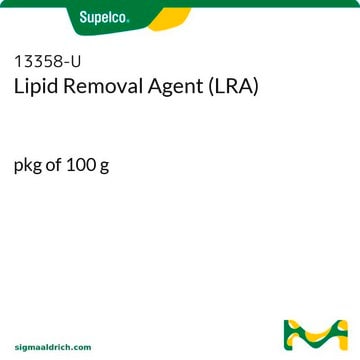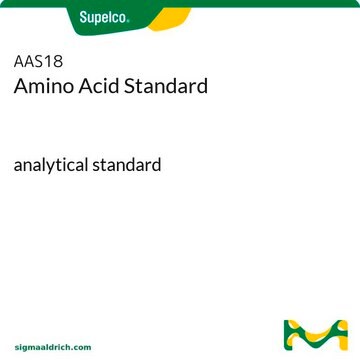13360-U
Lipid Removal Agent (LRA)
pkg of 500 g
Sinónimos:
polymeric adsorbent, XAD-2
Iniciar sesiónpara Ver la Fijación de precios por contrato y de la organización
About This Item
Productos recomendados
grade
reagent grade
Quality Level
form
powder
packaging
pkg of 500 g
technique(s)
LPLC: suitable
surface area
120 m2/g
matrix
Silica
matrix active group
silica
particle size
325 mesh
pore size
90 Å mean pore size
General description
LRA, the synthetic adsorbent of crystalline calcium silicate hydrate is used for removing lipids and endotoxin from plasma or aqueous solutions. It is also used for DNA purification to remove protein, RNA and genomic DNA.
Application
- Lipid removal agent (LRA) was used for absorption of lipids using gel permeation chromatography.
- LRA was used to isolate lipoprotein particles from coeluting proteins in collected fraction from Gel filtration chromatography.
Storage Class
11 - Combustible Solids
wgk_germany
WGK 1
flash_point_f
Not applicable
flash_point_c
Not applicable
ppe
dust mask type N95 (US), Eyeshields, Gloves
Elija entre una de las versiones más recientes:
¿Ya tiene este producto?
Encuentre la documentación para los productos que ha comprado recientemente en la Biblioteca de documentos.
Los clientes también vieron
Anita Krisko et al.
Genome biology, 15(3), R44-R44 (2014-03-04)
The genetic code is redundant, meaning that most amino acids can be encoded by more than one codon. Highly expressed genes tend to use optimal codons to increase the accuracy and speed of translation. Thus, codon usage biases provide a
Anita Krisko et al.
PLoS genetics, 9(9), e1003810-e1003810 (2013-09-27)
Although the genome contains all the information necessary for maintenance and perpetuation of life, it is the proteome that repairs, duplicates and expresses the genome and actually performs most cellular functions. Here we reveal strong phenotypes of physiological oxidative proteome
Stephen W C Chung et al.
Journal of chromatography. A, 1218(33), 5555-5567 (2011-07-12)
Organochlorine pesticide (OCP) residues in foods have been of concern for several decades. However, the analysis of some of the OCPs and their metabolites or derivatives, such as endrin aldehyde, endrin ketone, nonachlor, etc. in fatty foods (including foods of
John P Zhang et al.
Biotechnology progress, 21(4), 1220-1225 (2005-08-06)
A synthetic adsorbent of crystalline calcium silicate hydrate, the product LRA by Advanced Minerals Corp., has been studied for endotoxin removal from aqueous solutions. This adsorbent removes endotoxin effectively, and the removal is greatly enhanced by the presence of an
Scott M Gordon et al.
Journal of proteome research, 9(10), 5239-5249 (2010-08-20)
Plasma levels of high density lipoprotein cholesterol (HDL-C) are inversely proportional to the incidence of cardiovascular disease. Recent applications of modern proteomic technologies have identified upward of 50 distinct proteins associated with HDL particles with many of these newly discovered
Nuestro equipo de científicos tiene experiencia en todas las áreas de investigación: Ciencias de la vida, Ciencia de los materiales, Síntesis química, Cromatografía, Analítica y muchas otras.
Póngase en contacto con el Servicio técnico







